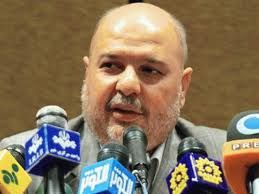
Iranian deputy oil minister, Alireza Zeighami, announced on Saturday that Iran has launched a liquefied gas swap route in the Caspian Sea.
The Mehr News Agency quoted Zeighami as saying that swapping other oil products, such as furnace oil, is currently underway with the Caspian Sea littoral states.
Iran has not stopped oil swaps, he said, adding that liquefied gas swaps had been carried out mainly via rail networks.
An official with the National Iranian Oil Company (NIOC) on July 7 absolutely rejected some news claiming that Iran has stopped swapping crude oil, saying that two ships carry Iranian oil at the Caspian Sea and deliver at the Persian Gulf on the weekly basis.
The Mehr News Agency quoted the unnamed official as saying that swapping crude oil is underway as it was in the past. "Crude oil is loaded at the Neka Port and is delivered to international customers at the Persian Gulf".
Between 15,000-30,000 barrels of crude oil is swapped per day despite sanctions against the Islamic Republic's oil industry, the official noted.
"Iran has provided necessary facilities to increase oil swap with Central Asian countries through its northern oil terminal, the managing director of the Iranian Oil Terminals Company (IOTC), Pirouz Mousavi, said in February.
Mousavi said that IOTC is ready to increase oil swap operations between Iran and its oil-producing neighbors in Central Asia.
The official stated that the company gives priority to upgrading its oil swap terminal in Neka, in northern Iran, as the starting point of a major pipeline project which will connect Neka to the port city of Jask in southern Iran.
According to the official statistics released by NIOC, an average of 20,000 barrels per day (bpd) of crude oil produced by Caspian Sea littoral countries is currently being swapped for delivery in the Persian Gulf and the figure is expected to hit 70,000 bpd in the coming months.
Iran stopped oil swap with Caspian Sea littoral states in April 2010 after having swapped their oil for 13 years. On July 2, 2011, NIOC Managing Director Ahmad Qalebani announced the resumption of oil swaps with Caspian states, saying that the volume of oil swap was being negotiated.
The oil Iran imports from the Central Asian countries are refined in Tehran and Tabriz and then delivered to the buyers from the Persian Gulf.
We use cookies to improve your experience. By continuing to use our site, you accept our Cookies, Privacy Policy,Terms and Conditions. Close X